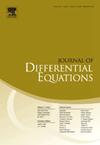More limit cycles for complex differential equations with three monomials
IF 2.4
2区 数学
Q1 MATHEMATICS
引用次数: 0
Abstract
In this paper we improve, by almost doubling, the existing lower bound for the number of limit cycles of the family of complex differential equations with three monomials, , being non-negative integers and . More concretely, if and denotes the maximum number of limit cycles of the above equations, we show that for , and that for some values of N this new lower bound is . We also present examples with many limit cycles and different configurations. Finally, we show that and study in detail the quadratic case with three monomials proving in some of them non-existence, uniqueness or existence of exactly two limit cycles.
有三个单项式的复微分方程的更多极限循环
在本文中,我们改进了复微分方程族中三个单项式 z˙=Azkz¯l+Bzmz¯n+Czpz¯q 的极限循环数的现有下界,几乎翻了一番,k,l,m,n,p,q 为非负整数,A,B,C∈C。更具体地说,如果 N=max(k+l,m+n,p+q),H3(N)∈N∪{∞} 表示上述方程的最大极限循环数,我们将证明对于 N≥4 时,H3(N)≥N-3,并且对于某些 N 值,这一新的下界是 N+1。我们还举例说明了许多极限循环和不同配置。最后,我们证明了 H3(2)≥2,并详细研究了有三个单项式的二次情况,证明了其中某些情况下两个极限循环不存在、唯一或存在。
本文章由计算机程序翻译,如有差异,请以英文原文为准。
求助全文
约1分钟内获得全文
求助全文
来源期刊
CiteScore
4.40
自引率
8.30%
发文量
543
审稿时长
9 months
期刊介绍:
The Journal of Differential Equations is concerned with the theory and the application of differential equations. The articles published are addressed not only to mathematicians but also to those engineers, physicists, and other scientists for whom differential equations are valuable research tools.
Research Areas Include:
• Mathematical control theory
• Ordinary differential equations
• Partial differential equations
• Stochastic differential equations
• Topological dynamics
• Related topics

 求助内容:
求助内容: 应助结果提醒方式:
应助结果提醒方式:


